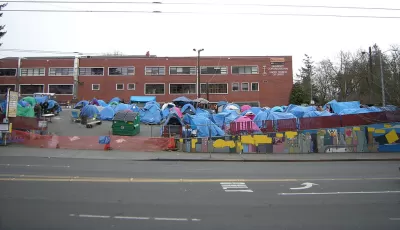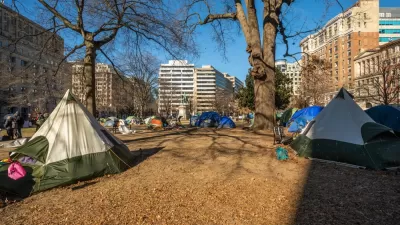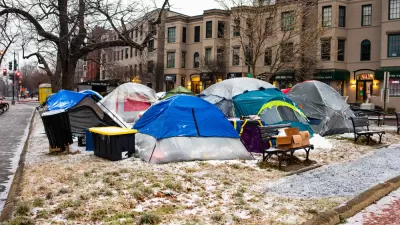Weeks after federal officials evicted unhoused people from a Washington, D.C. park, research indicates that similar actions, which usually come at a high cost to cities, have little impact on homelessness in the long term.

A report from the Department of Housing and Urban Development (HUD) and the Department of Health and Human Services (HHS) finds that ‘sweeps’ of homeless encampments, in which officials displace residents from established encampments, are “expensive and often of limited long-term effectiveness,” despite their popularity with many local politicians responding to pressure from community groups. Karen Kroll describes the report’s findings in Smart Cities Dive.
According to critics of the policy, “A sweep that doesn’t include services to help homeless individuals transition toward more permanent housing does little to address the underlying challenges that led to the encampment in the first place, say advocates for people who are homeless.” In the worst cases, “A sweep can set back individuals who were moving toward housing stability and, perhaps, working with a caseworker who knows where to find them.”
Activists say sweeps can be made less disruptive by providing ample notice, “intentional relationship-building” with residents to connect them to resources and services, and working with residents to help them keep their belongings, which often include important items like driver’s licenses. The report highlights a successful example from Denver, where, out of 360 people housed through a supportive housing program, 77 percent remained in stable housing three years later. “As the Denver experiment revealed, providing services that connect individuals to permanent housing is more effective than just clearing homeless encampments, a senior HUD official said.”
FULL STORY: Homeless encampment sweeps costly and of limited long-term effectiveness, according to federal research

Planetizen Federal Action Tracker
A weekly monitor of how Trump’s orders and actions are impacting planners and planning in America.

San Francisco's School District Spent $105M To Build Affordable Housing for Teachers — And That's Just the Beginning
SFUSD joins a growing list of school districts using their land holdings to address housing affordability challenges faced by their own employees.

Can We Please Give Communities the Design They Deserve?
Often an afterthought, graphic design impacts everything from how we navigate a city to how we feel about it. One designer argues: the people deserve better.

Judge Halts Brooklyn Bike Lane Removal
Lawyers must prove the city was not acting “arbitrarily, capriciously, and illegally” in ordering the hasty removal.

Engineers Gave America's Roads an Almost Failing Grade — Why Aren't We Fixing Them?
With over a trillion dollars spent on roads that are still falling apart, advocates propose a new “fix it first” framework.

The European Cities That Love E-Scooters — And Those That Don’t
Where they're working, where they're banned, and where they're just as annoying the tourists that use them.
Urban Design for Planners 1: Software Tools
This six-course series explores essential urban design concepts using open source software and equips planners with the tools they need to participate fully in the urban design process.
Planning for Universal Design
Learn the tools for implementing Universal Design in planning regulations.
Borough of Carlisle
Smith Gee Studio
City of Camden Redevelopment Agency
City of Astoria
Transportation Research & Education Center (TREC) at Portland State University
City of Camden Redevelopment Agency
Municipality of Princeton (NJ)





























